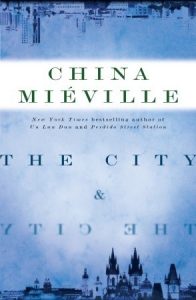What do English profs do during the summer? We read, of course!
And when we read, we get so excited that we can’t help raving about the books . . . because, hey!–you might like them, too.
Heather McAlpine: What I’m Reading this Summer
As some of you may know, I’ve been on sabbatical for this past academic year — meaning I’ve been working intensively on a research project rather than teaching. It has been a fantastic experience but it has also meant that I’m writing more and reading a lot more academic articles and many fewer poems and novels than I tend to do in a usual year. My summertime reading plans are pretty eclectic as a result….
The City & the City, China Mieville
If you’re a fan of dark, weird, dystopian detective stories, you’d probably enjoy this book. The story takes place in a pair of fictional Eastern European cities that share the same geographical space. The citizens of Beszel are required to “unsee” — that is, consciously suppress their perception of — the people, buildings, and things deemed to be located in Ul Qoma, and vice-versa, or they risk being caught and “disappeared” by the shadowy enforcement agency known only as “Breach.” The murder mystery at the heart of the story keeps the plot moving along, but it’s this strange (yet uncannily believable) psycho-geographical wrinkle that makes the book fascinating to read.
Jughead vol. I, Chip Zdarsky and Erica Henderson
What’s a summer reading list without a comic book or two (I always say!) This year I’m reading Jughead, vol. I — part of the recent Archie Comics reboot of its classic characters. Jughead takes the character and the storytelling beyond what you’d expect if you’re only familiar with the old supermarket checkout stand digests: this award-winning comic volume includes government conspiracies, vivid daydreams about time travel, a revelation about Jughead’s sexuality and — of course — an obsessive focus on hamburgers. The whole thing is self-aware, silly, and a lot of fun to read.
Teaching to Transgress, bell hooks
This one is inspirational if you have any interest in pedagogy and thinking about what education can accomplish beyond conveying information. In a series of loosely connected essays mixing philosophy, storytelling, and memoir, bell hooks unfolds her argument that truly effective teaching sets people free: she defines education as “the practice of freedom” and advocates pedagogical strategies that dismantle social systems of oppression in order to liberate students. As I contemplate my own return to the classroom, this book is giving me plenty to think about.


Comments are closed.